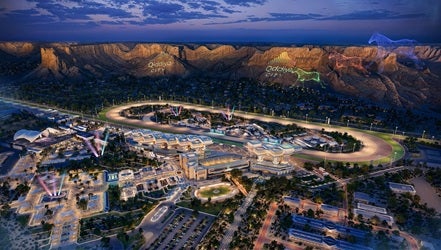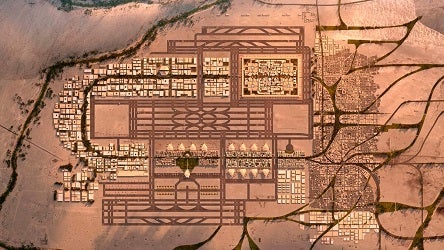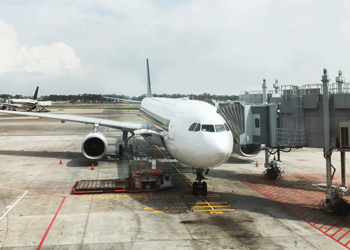Hail and Ghasha galvanises UAE upstream market
12 October 2023
 This package on the UAE’s upstream sector also includes:
This package on the UAE’s upstream sector also includes:
> Adnoc seeks commercial bids for Upper Zakum
> Adnoc Onshore awards Sahil field upgrade contract
> Dubai-owned Dragon Oil to boost production in Egypt and Iraq
> Oil and gas players at Adipec strive for net-zero goals
> Adnoc awards $17bn EPC contracts for Hail and Ghasha
> Dana Gas makes changes to leadership

The UAE has made a giant leap towards becoming self-sufficient in natural gas production with Abu Dhabi National Oil Company's (Adnoc's) final investment decision on the Hail and Ghasha offshore sour gas project.
Adnoc and its partners in the Ghasha concession awarded contracts worth $16.94bn in early October for engineering, procurement and construction (EPC) works on the Hail and Ghasha project.
The investment represents the largest-ever capital expenditure (capex) on an oil and gas project in the UAE. As such, it will have a galvanising, trickle-down effect on the UAE oil and gas supply chain.
Hail and Ghasha programme
The Hail and Ghasha fields are part of Abu Dhabi’s Ghasha concession, which is expected to produce more than 1.5 billion cubic feet a day (cf/d) of gas before the end of this decade.
Adnoc holds the majority 55 per cent stake in the Ghasha concession. The other stakeholders are Italian energy major Eni with 25 per cent, Germany’s Wintershall Dea with 10 per cent, and Austria’s OMV and Russia’s Lukoil, each with 5 per cent.
A consortium of Abu Dhabi’s National Petroleum Construction Company (NPCC) and Italian contractor Saipem was awarded the project's offshore engineering, procurement and construction (EPC) package. Its value is $8.2bn, with Saipem declaring its share to be worth $4.1bn.
The scope of work broadly involves the EPC of offshore facilities, including facilities on artificial islands and subsea pipelines.
Italy-headquartered Tecnimont was awarded the onshore EPC contract. The $8.74bn contract relates to the EPC of onshore facilities, including carbon dioxide (CO2) and sulphur recovery and handling.
The Hail and Ghasha project was initiated by Adnoc in 2018, with at least three EPC tendering rounds since. Its size and scope made it a vastly strategic proposition, hence shelving the gas production programme was not an option.
Through achieving the FID and awarding close to $17bn-worth of EPC contracts, Adnoc and its Ghasha concession partners have demonstrated the project's importance in ensuring the UAE is self-sufficient in gas by 2030.
NEWS FROM ADIPEC:
> Adnoc doubles 2030 carbon capture target
> Adnoc Gas awards $615m carbon capture contract
> Adnoc and Oxy to study direct air capture project
> Firms bid for Abu Dhabi airport tank farms project
> Sharjah and Ras al-Khaimah sign gas storage deal
Oil production push
Adnoc is also accelerating projects deemed vital to reaching its goal of 5 million barrels a day (b/d) of oil production potential by 2027, a target that has been brought forward from 2030.
Raising output from Abu Dhabi’s offshore oil fields is necessary for Adnoc to increase its overall crude production capacity. With this in mind, the Abu Dhabi energy giant has committed capex to key projects to raise output from the Upper Zakum and Lower Zakum offshore hydrocarbon concessions.
Through the UZ1000 project, Adnoc Group subsidiary Adnoc Offshore aims to grow oil production from Upper Zakum to 1.2 million b/d.
The main work scope involves the EPC of multiple surface facilities and plants at the Upper Zakum offshore development’s four main artificial islands of Al-Ghallan, Umm al-Anbar, Ettouk and Asseifiya – also known as Central Island, West Island, North Island and South Island, respectively.
Contractors submitted technical bids for EPC works on the Upper Zakum oil production increment project by 5 June. Adnoc Offshore has set a deadline of 23 October to submit commercial bids for the project.
Separately, Adnoc Offshore has undertaken a couple of projects to increase oil and gas production from the Lower Zakum field in Abu Dhabi’s waters.
Adnoc Offshore and its partners in the Lower Zakum concession intend to sustain oil production from the asset at its current level of 450,000 b/d until 2025, and then increase output to 470,000 b/d. This target will be achieved through the Lower Zakum early production scheme 2 (EPS 2) and proved developed producing (PDP) project.
Contractors submitted technical bids for the EPC works on the Lower Zakum EPS 2/PDP project by 11 September. While the EPS 2/PDP project is anticipated to increase the Lower Zakum concession’s oil production potential to 470,000 b/d by 2027, Adnoc Offshore’s larger, longer-term objective is to raise the asset’s output capacity to 520,000 b/d by 2027 and maintain that level until 2034.
This strategic goal will be accomplished through the Lower Zakum Long-Term Development Plan (LTDP-1) project. Front-end engineering and design (feed) work is progressing on the Lower Zakum LTDP-1 project and is being performed by France’s Technip Energies.
Onshore oil output
Adnoc Onshore, meanwhile, has started a slew of projects to spike crude output from fields such as Asab, Bab, Northeast Bab, Bu Hasa, Mender, Qusahwira, Sahil and Shah.
An EPC contract, estimated to be worth more than $300m, for the third development phase of the Sahil oil field was recently awarded by Adnoc Onshore to local contractor Target Engineering Construction Company.
Another project being pursued by Adnoc Onshore relates to the conversion of wells and installation of associated tie-ins at the southeast cluster of oil fields in Abu Dhabi. The EPC scope of work has been divided into two packages, with technical bids submitted by contractors in August.
Increasing production from Abu Dhabi’s onshore fields, some of which have been in operation since the 1960s, is equally crucial for Adnoc to hit its 5 million b/d by 2027 target. The capacity enhancement projects that Adnoc Onshore has been advancing indicate the importance its parent entity attaches to maintaining and raising output from its onshore assets.
Exclusive from Meed
-
 AI signals a new efficiency era for oil and gas
AI signals a new efficiency era for oil and gas11 February 2026
-
 February deadline for Qiddiya racecourse bids
February deadline for Qiddiya racecourse bids11 February 2026
-
 King Salman airport signs mixed-use project agreements
King Salman airport signs mixed-use project agreements11 February 2026
-
 Saudi Arabia signs $5.3bn Syria reconstruction deal
Saudi Arabia signs $5.3bn Syria reconstruction deal11 February 2026
-
 Indian firm wins contract for UAE battery project
Indian firm wins contract for UAE battery project11 February 2026
All of this is only 1% of what MEED.com has to offer
Subscribe now and unlock all the 153,671 articles on MEED.com
- All the latest news, data, and market intelligence across MENA at your fingerprints
- First-hand updates and inside information on projects, clients and competitors that matter to you
- 20 years' archive of information, data, and news for you to access at your convenience
- Strategize to succeed and minimise risks with timely analysis of current and future market trends

Related Articles
-
 AI signals a new efficiency era for oil and gas
AI signals a new efficiency era for oil and gas11 February 2026
Artificial intelligence (AI) is poised to deliver one of the biggest leaps in operational efficiency the oil and gas industry has seen in decades – but not in the ways most expect. In a sector where progress is typically measured in micro-optimisations, harsh terrain, sprawling pipelines and escalating security risks make even small improvements valuable. Now, machine learning, edge computing, the industrial internet of things (IIoT), cloud and big data are converging into something far more disruptive.
 A major global oil and gas player recently tested an intriguing Proof of Concept with Nokia, leveraging existing fiber buried along pipelines for real-time “fiber sensing.” What they uncovered could reshape how infrastructure threats are detected. Optical fiber, it turns out, is sensitive enough to register disturbances caused by everything from rainfall to trucks, earthquakes and human intrusion. When paired with long-range anomaly detection, the implications for pipeline safety stretch far beyond routine monitoring. Just how precise – and how operational teams might act on these signals – remains part of the unfolding story.
A major global oil and gas player recently tested an intriguing Proof of Concept with Nokia, leveraging existing fiber buried along pipelines for real-time “fiber sensing.” What they uncovered could reshape how infrastructure threats are detected. Optical fiber, it turns out, is sensitive enough to register disturbances caused by everything from rainfall to trucks, earthquakes and human intrusion. When paired with long-range anomaly detection, the implications for pipeline safety stretch far beyond routine monitoring. Just how precise – and how operational teams might act on these signals – remains part of the unfolding story.Telemetry data, already flowing in vast quantities between remote operations and headquarters, is fuelling even more ambitious AI use cases. Predictive bandwidth scaling, digital twinning, precision timing optimisation and automated network reconfiguration are all being explored to strengthen performance and resiliency. But with high innovation comes high stakes: one model glitch could invalidate results, burn time and inflate costs. How companies balance the promise of AI with the risks of over-automation is a tension worth watching.
Then there’s the looming security horizon. Cybercrime already threatens data-heavy operations, but oil and gas firms are increasingly preparing for something even more destabilising – the quantum threat. While cryptographically relevant quantum computers aren’t here yet, adversaries are already stockpiling encrypted data using Harvest Now Decrypt Later tactics. Multi-layer encryption defences like OTNsec, ANYsec and MACsec offer new protective possibilities, but questions remain around scalability, adoption barriers and readiness timelines.
To unlock AI’s full potential, oil and gas networks must evolve to deliver extreme speed, low latency, massive compute support and future-proof security. Nokia has built solutions across all these fronts, including private 4G/5G for remote industrial environments. But what specific breakthroughs lie ahead – and how soon they could impact global operations – is where the real curiosity begins.
The summary hints at the disruption. The details? That’s inside the full article here.
Published in partnership with
 https://image.digitalinsightresearch.in/uploads/NewsArticle/15627990/main.gif
https://image.digitalinsightresearch.in/uploads/NewsArticle/15627990/main.gif -
 February deadline for Qiddiya racecourse bids
February deadline for Qiddiya racecourse bids11 February 2026

Register for MEED’s 14-day trial access
Saudi gigaproject developer Qiddiya Investment Company (QIC) has allowed bidders until 15 February to submit bids for a tender covering the construction of a racecourse at the entertainment city of Qiddiya, on the outskirts of Riyadh.
MEED understands that the tender was issued in December. The previous deadline was 26 January.
The racecourse venue will cover 1.3 million square metres (sq m) and accommodate 70,000 spectators.
QIC formally announced the project on 10 February.
According to a statement published on its website, “The venue will include the region’s first straight-mile turf course, alongside a 2.2 kilometre (km) main turf track and a 2.4km inner dirt track.
“A 21,000-seat grandstand will anchor the venue, with the ability to expand capacity to up to 70,000 guests through event overlays during major race days,” the statement added.
A centrepiece of the venue will be a 110-metre central parade ring, located in the middle of the racecourse.
The project also includes an Equine Hospital that will provide advanced veterinary services, including diagnostics, surgery, rehabilitation and emergency care for horses.
The Qiddiya City horse racing venue is one of several major projects within the greater Qiddiya development. Other projects include an e-games arena, the Prince Mohammed Bin Salman Stadium, a motorsports track, a performing arts centre, the Dragon Ball and Six Flags theme parks, and Aquarabia.
The project is a key part of Riyadh’s strategy to boost leisure tourism in the kingdom. According to GlobalData, leisure tourism in Saudi Arabia has experienced significant growth in recent years.
https://image.digitalinsightresearch.in/uploads/NewsArticle/15626248/main.jpg -
 King Salman airport signs mixed-use project agreements
King Salman airport signs mixed-use project agreements11 February 2026
Register for MEED’s 14-day trial access
King Salman International Airport Development Company (KSIADC) has signed multiple memorandums of understanding with local firms to develop several mixed-use projects within King Salman International airport (KSIA) in Riyadh.
The agreements were signed on the sidelines of the Private Sector Forum 2026 in Riyadh.
The agreements involved major investment and development firms, including Sumou Holding, Mohammed Al-Habib Investment, Kinan, Ajdan, Retal, Urjuan and Osus.
The developments will comprise residential, commercial, retail, hospitality, entertainment and other related projects.
These developments will be located within the airport’s master development area, 12 square kilometres (sq km) of which are allocated for real estate development.
According to a statement published by the Saudi Press Agency, “KSIADC’s development scope also includes integrated economic and logistics zones covering approximately 3 million square metres, aligning real-estate development with economic activity and supporting services."
Project scale
The project covers an area of about 57 sq km, allowing for six parallel runways, and will include the existing terminals at King Khalid International airport.
The airport aims to accommodate up to 100 million passengers by 2030. The cargo processing goal is to reach 2 million tonnes a year by 2030.
Saudi Arabia plans to invest significantly in its aviation sector. Riyadh’s Saudi Aviation Strategy, announced by the General Authority of Civil Aviation, aims to triple Saudi Arabia’s annual passenger traffic to 330 million travellers by 2030.
It also aims to increase air cargo traffic to 4.5 million tonnes and raise the country’s total air connections to more than 250 destinations.
 READ THE FEBRUARY 2026 MEED BUSINESS REVIEW – click here to view PDF
READ THE FEBRUARY 2026 MEED BUSINESS REVIEW – click here to view PDFSpending on oil and gas production surges; Doha’s efforts support extraordinary growth in 2026; Water sector regains momentum in 2025.
Distributed to senior decision-makers in the region and around the world, the February 2026 edition of MEED Business Review includes:
> AGENDA: Mena upstream spending set to soar> INDUSTRY REPORT: MEED's GCC water developer ranking> INDUSTRY REPORT: Pipeline boom lifts Mena water awards> MARKET FOCUS: Qatar’s strategy falls into place> CURRENT AFFAIRS: Iran protests elevate regional uncertainty> CONTRACT AWARDS: Contract awards decline in 2025> LEADERSHIP: Tomorrow’s communities must heal us, not just house us> INTERVIEW: AtkinsRealis on building faster> LEADERSHIP: Energy security starts with rethinking wasteTo see previous issues of MEED Business Review, please click herehttps://image.digitalinsightresearch.in/uploads/NewsArticle/15626197/main.jpg -
 Saudi Arabia signs $5.3bn Syria reconstruction deal
Saudi Arabia signs $5.3bn Syria reconstruction deal11 February 2026
Register for MEED’s 14-day trial access
Saudi Arabia has signed a package of strategic agreements with Syria valued at $5.3bn (SR20bn) to progress Damascus’s reconstruction efforts.
The agreements span aviation, telecommunications, energy, water, industry, real estate and development finance, and involve both public and private Saudi entities.
The most significant deal will see Saudi Arabia and Syria jointly support the creation of a new low-cost carrier based in Syria – Flynas Syria – in a 51-49 joint venture between the Syrian General Authority of Civil Aviation and Saudi low-cost carrier Flynas.
The carrier is scheduled to begin operations in the fourth quarter of 2026, with routes planned across the Middle East, Africa and Europe.
Other aviation infrastructure also features prominently, with Saudi Arabia also announcing the launch of the ‘Elaf Fund’ and committing $2bn (SR7.5bn) to the phased development and modernisation of two international airports in Aleppo.
The programme will include runway upgrades, terminal expansion and logistics facilities, transforming the northern city into a regional transport and cargo hub.
Some of the deals confirmed previously announced commitments, including a $1bn telecommunications infrastructure investment agreement signed by Saudi Telecom Company (STC) under the ‘SilkLink’ project.
This initiative will see STC construct a 4,500-kilometre fibre-optic network across Syria, develop data centres and establish international submarine cable landing stations.
Saudi Arabia previously committed to investing $1bn into Syria’s telecommunications infrastructure in July 2025, as part of $6.4bn in commitments across 47 agreements announced at the Syrian-Saudi Investment Forum in Damascus.
The kingdom’s Water Transmission Company and Acwa also signed an agreement to develop a large-scale seawater desalination project with a capacity of 1.2 million cubic metres a day.
Riyadh Cables Group will meanwhile help modernise the production capabilities of the Syrian Modern Cables Company, and three separate agreements were signed for large residential and commercial real estate developments.
With the lifting of US sanctions in late 2025, the pathway for Gulf countries to proceed with such commitments and for Syria to re-enter regional markets has opened.
 READ THE FEBRUARY 2026 MEED BUSINESS REVIEW – click here to view PDF
READ THE FEBRUARY 2026 MEED BUSINESS REVIEW – click here to view PDFSpending on oil and gas production surges; Doha’s efforts support extraordinary growth in 2026; Water sector regains momentum in 2025.
Distributed to senior decision-makers in the region and around the world, the February 2026 edition of MEED Business Review includes:
> AGENDA: Mena upstream spending set to soar> INDUSTRY REPORT: MEED's GCC water developer ranking> INDUSTRY REPORT: Pipeline boom lifts Mena water awards> MARKET FOCUS: Qatar’s strategy falls into place> CURRENT AFFAIRS: Iran protests elevate regional uncertainty> CONTRACT AWARDS: Contract awards decline in 2025> LEADERSHIP: Tomorrow’s communities must heal us, not just house us> INTERVIEW: AtkinsRealis on building faster> LEADERSHIP: Energy security starts with rethinking wasteTo see previous issues of MEED Business Review, please click herehttps://image.digitalinsightresearch.in/uploads/NewsArticle/15625394/main.gif -
 Indian firm wins contract for UAE battery project
Indian firm wins contract for UAE battery project11 February 2026
Register for MEED’s 14-day trial access
India’s KPI Green Energy has won a contract to deliver a solar and battery energy storage system (bess) in the UAE.
The scope includes the supply, installation and commissioning of a 33kWp solar power system integrated with a 573kWh battery energy storage system to power a containerised data centre.
The award was confirmed through a purchase order issued by FVE Lifecare, a UAE private trading company. The firm is understood to be procuring the solar-bess system for an internal or third-party data centre.
KPI Green Energy said the project will be delivered through its subsidiary Sun Drops Energia.
The package also covers a 120kVA modular UPS system, electrical panels, cabling and full system integration.
The contract is small-scale but reflects broader momentum for battery storage in the UAE across both private facilities and the national grid.
Construction is expected to begin this month on the UAE’s largest grid-side energy storage project to be awarded through open tender.
Called Bess 1, the project closely follows the model of Abu Dhabi’s independent power project (IPP) programme, in which developers enter into a long-term energy storage agreement (ESA) with Ewec as the sole procurer.
Etihad Water & Electricity (EtihadWE) and South Korea’s Kepco won the award to develop the project in October.
Emirates Utilities Development Company, a subsidiary of EtihadWE, will develop and operate the project in partnership with Kepco.
Chinese firm Dongfang International is the engineering, procurement and construction contractor.
 READ THE FEBRUARY 2026 MEED BUSINESS REVIEW – click here to view PDF
READ THE FEBRUARY 2026 MEED BUSINESS REVIEW – click here to view PDFSpending on oil and gas production surges; Doha’s efforts support extraordinary growth in 2026; Water sector regains momentum in 2025.
Distributed to senior decision-makers in the region and around the world, the February 2026 edition of MEED Business Review includes:
> AGENDA: Mena upstream spending set to soar> INDUSTRY REPORT: MEED's GCC water developer ranking> INDUSTRY REPORT: Pipeline boom lifts Mena water awards> MARKET FOCUS: Qatar’s strategy falls into place> CURRENT AFFAIRS: Iran protests elevate regional uncertainty> CONTRACT AWARDS: Contract awards decline in 2025> LEADERSHIP: Tomorrow’s communities must heal us, not just house us> INTERVIEW: AtkinsRealis on building faster> LEADERSHIP: Energy security starts with rethinking wasteTo see previous issues of MEED Business Review, please click herehttps://image.digitalinsightresearch.in/uploads/NewsArticle/15623323/main.jpg


